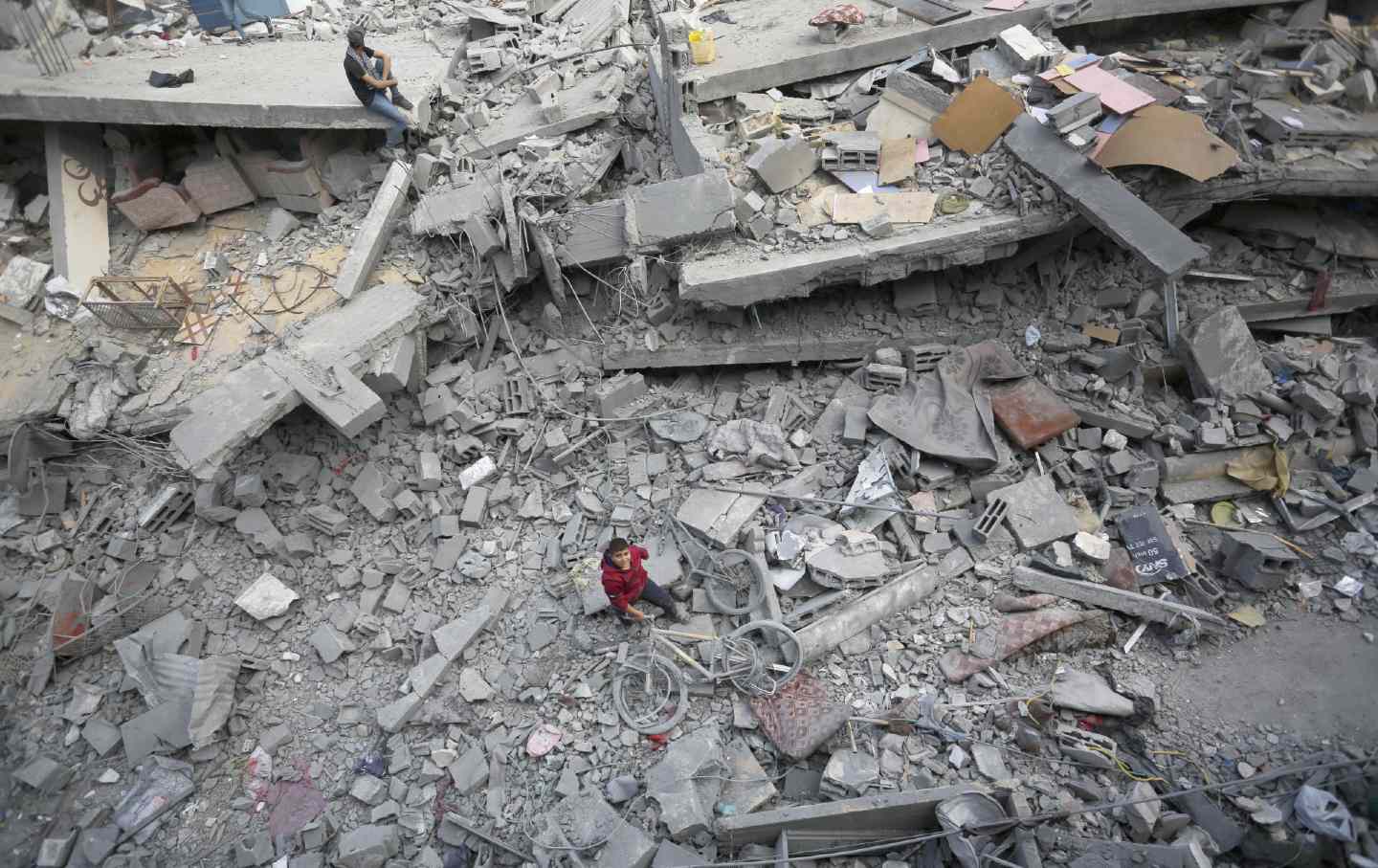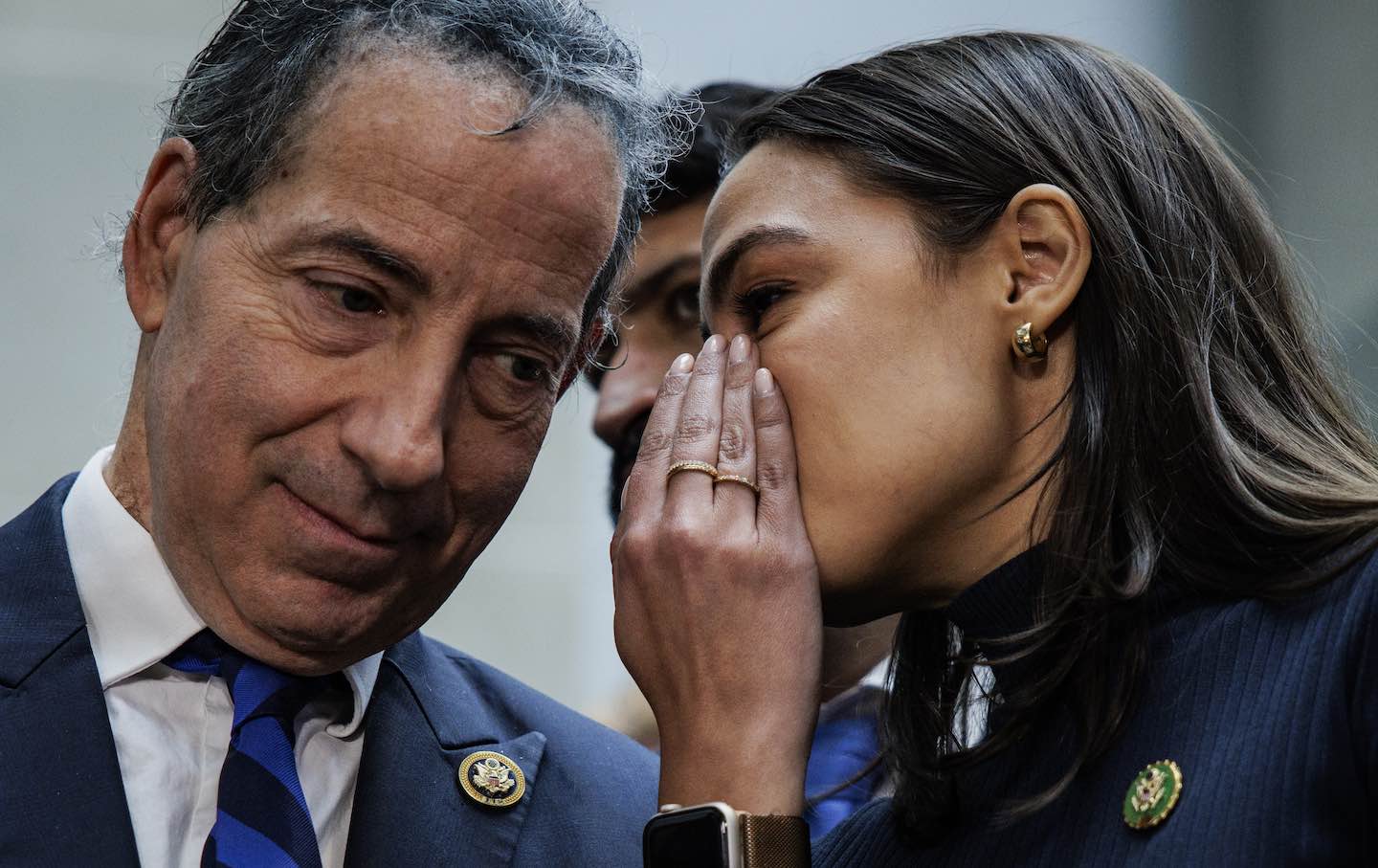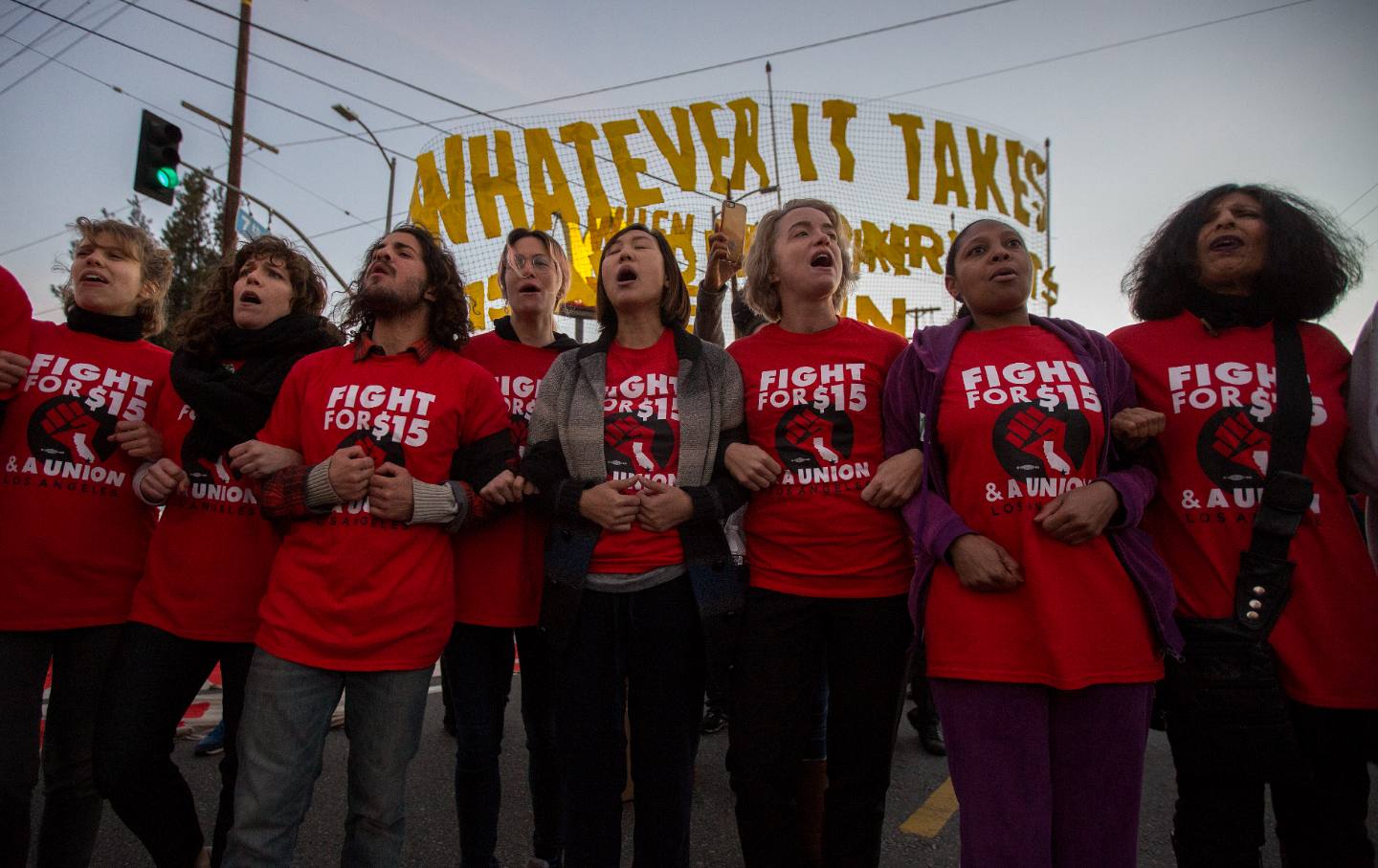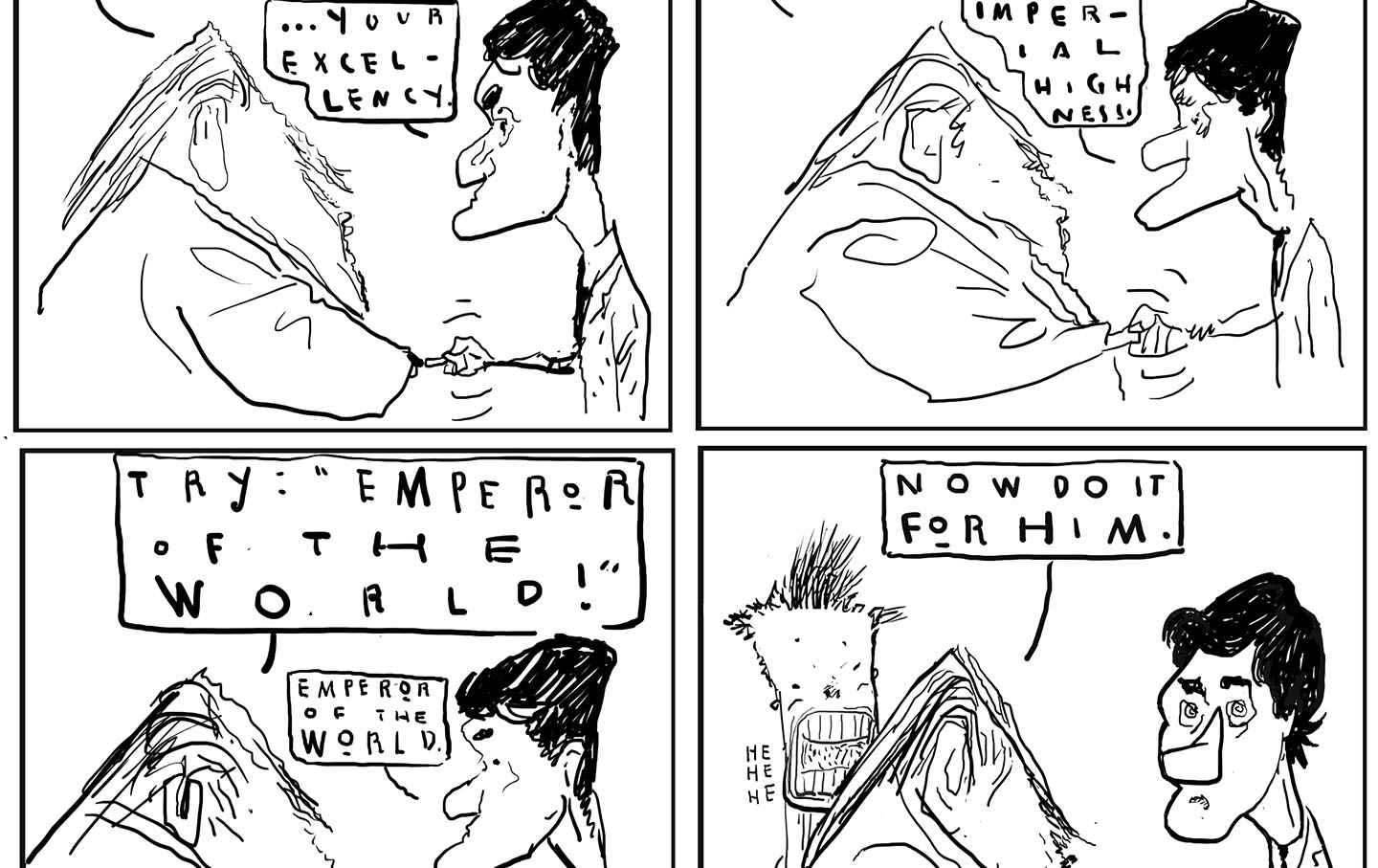It’s Never Been About Freeing the Hostages
Israel’s scorched-earth campaign will cruelly shape the lives of many future generations of Palestinians—and that’s the point.

Palestinians in a destroyed residential area try to collect usable items under the rubble.
(Ashraf Amra / Anadolu via Getty Images)This article originally appeared at TomDispatch.com. To stay on top of important articles like these, sign up to receive the latest updates from TomDispatch.com.
As Amal Nassar lay in pain on a bed at the Al-Awda Hospital in the Nuseirat refugee camp in northern Gaza, the echoes of explosions and artillery fire could be heard all around her. It was mid-January and she had made her way to the embattled hospital to give birth to a baby girl she would name Mira. While Amal should have been celebrating her infant’s delivery, instead she was engulfed in fear, surrounded by the relentless nightmare of death and suffering that she and her family had experienced for months.
“I was muttering to myself, ‘I hope I die,’” she recalled.
Though gut-wrenching, Amal’s story is not unlike those of so many other young mothers in Gaza today. The World Health Organization estimates that more than 50,000 pregnant women are barely surviving there, while having babies at the rate of 180 births a day. Many of those women (especially in the north) are acutely malnourished and few received any medical attention before their labor pains began, often weeks ahead of schedule.
According to a bleak report released in March by UNICEF, the thousands of infants born in Gaza over the previous two months (and ever since) are at great risk of dying. Many already have, although numbers are hard to come by.
“There are babies who died in their mothers’ wombs and surgeries were performed to remove the dead fetuses,” said Dr. Muhammad Salha, acting director of Al-Awda Hospital, where the situation couldn’t be more dire. “Mothers are not eating because of the conditions we are living in, and this affects the infants.… There are [cases] of many children suffering from dehydration and malnutrition, leading to death.”
Western healthcare providers who have returned from Gaza describe genuinely horrific scenes. Dr. Nahreen Ahmed, a Philadelphia-based doctor and the medical director of the humanitarian aid group MedGlobal, left Gaza in late March, her second time on the front lines since Israel launched its assault nearly eight months ago. What she witnessed has changed her forever.
“There’s not enough space for us to work closely with the mothers to help them start lactating again. We can’t even access them. And to be able to do that, you have to have day-to-day activities with those women, and that is not something that’s possible for us right now. Those children need to be breastfed. If they can’t be breastfed, they need formula,” Dr. Ahmed told Democracy Now! host Amy Goodman. “What we’re talking about is women who are squeezing fruits, dates into handkerchiefs, into tissues, and feeding—drip-feeding their children with some sort of sugary substance to nourish them.”
Being born amid the rubble, amid a horrifying offensive, will undoubtedly scar future generations—if, that is, they’re lucky enough to survive the constant bombings and the denial of basic necessities like food, fuel, and medical aid. And as yet, despite mounting international pressure, threats of war crimes charges, and claims of genocide, Israel has shown no signs of relenting.
Onslaught of Revenge
From early on, Israeli leaders have been remarkably clear about their intentions in the Palestinian enclave. Israeli Colonel Yogez BarSheshet, speaking from Gaza in late 2023, put it bluntly: “Whoever returns here…will find scorched earth. No houses, no agriculture, no nothing. They have no future.”
It’s as if Israel’s leaders knew that, while it was impossible to actually destroy Hamas, they could at least obliterate Gaza’s infrastructure and slaughter civilians under the guise of hunting down terrorists. After seven long months of Israel’s onslaught of revenge, it’s clear that this has never been about freeing the hostages taken on October 7. Along the way, Israel could easily have accepted multiple proposals to do so, including a cease-fire resolution brokered by Egypt, Qatar, and the United States in early May. Instead, Prime Minister Benjamin Netanyahu and crew shot down that plan, in which Hamas had agreed to release all living hostages taken in its October 7 assault on Israel in exchange for Palestinians held in Israeli prisons. The sticking point, however, had nothing to do with the release of those captives rotting in Gaza under who knows what kind of stressful conditions, but Israel’s refusal to accept any resolution that includes a permanent cease-fire.
Immediately after nixing Hamas’s offer to release the hostages, Israel began bombing Rafah, home to more than a million refugees. Hundreds of thousands of them have since fled the city, displaced yet again. And despite Netanyahu’s now-discredited claim that he only had to destroy Hamas’s last four “battalions” in Rafah, the Israeli Defense Forces (IDF) soon found themselves back at it in the north as well, attacking areas where Hamas was once again said to be operating.
In response to protests that spread quickly on college campuses in the U.S., President Biden paid lip service to the outrage and paused shipments of U.S. military aid to Israel, only to reverse course a week later with a new $1-billion arms deal for that country.
Popular
“swipe left below to view more authors”Swipe →Depending on how Israel’s post–October 7 blood-soaked incursion into Gaza is evaluated, the military operation has either been a complete disaster or a monumental success. If the destruction of Gaza and the slaughtering of Palestinians was the intent, then Israel has certainly succeeded. If the return of the hostages and the destruction of Hamas was the goal, then it failed miserably. Either way, Israel has quickly become a pariah of its own making, something that never had to happen, and from which there may be no turning back.
The Damage Done
The specter of death in Gaza is difficult, if not impossible, to grasp. At a distance, our understanding of the situation often relies on somber statistics, especially in the establishment media. The official count, consistently cited by mainstream outlets, comes in at around 35,000 deaths.
In May, The New York Times and other outlets jumped on a report from the United Nations, which had apparently revised Gaza’s death count. But the UN did not, in fact, halve its total of women and children who had died, as The Jerusalem Post claimed. It simply altered its classification system in terms of those estimated to have died and those it could definitively confirm to be deceased. The totals, however, remained the same. Nonetheless, even those numbers, based on information provided by Gaza’s Ministry of Health, end up blurring the cruel reality on the ground. UN officials also fear that at least 10,000 more Gazans lie buried under the rubble in that 25-mile strip of land.
But death figures can also impart meaning, as the long-time consumer-rights activist Ralph Nader recently pointed out. He happens to believe that Israel could have killed at least 200,000 Palestinians in Gaza, a mind-boggling figure, but worth examining. So, I called on him to elaborate.
“The undercount is staggering,” said Nader, whose Lebanese parents emigrated to the United States before he was born. “The US and Israel want a low number, so they look around. Instead of themselves estimating—which they don’t want to do—they cling to Hamas’s [figures], and Hamas doesn’t want a realistic number because they don’t want to be seen as unable to protect their own people. So, they developed these criteria: to be counted, the dead must first be certified by hospitals and morgues [which barely exist].”
He has made it a habit to reach out to writers and editors. Like so many others, I have a bit of a phone affair with that 90-year-old thinker and activist. We discuss politics, baseball, and journalism’s rapid, insidious decline. I’ve certainly heard him animated in the past, but never more indignant than when he addresses the situation in Gaza. “The whole thing is one death camp now. It’s easily 200,000 deaths in Gaza,” he insisted, citing the number of bombs dropped, which have, by some estimates, exceeded 100,000. We know that at least 45,000 missiles and bombs had been used in Gaza within three months of the beginning of Israel’s military campaign. As a result, as many as 175,000 buildings have been damaged or destroyed by Israel. So, he seems to be on to something.
“Eventually [the real number of the dead] will come out,” he adds. “They’ll do a census, whoever takes over. The one thing the extended families in Gaza know is who’s been killed in their families.”
Of course, his assertion is circumstantial and he knows it, but he’s making a point. With so much of the Gaza Strip facing imminent starvation, nearly all hospitals out of commission, just about no medicine left, and very little clean water or food, 35,000 deaths are likely, in the end, to prove a drastic undercount.
“Not in Our Name”
The Holocaust, in which Nazis murdered 11 million people, 6 million of whom were Jews, was quite literally the textbook genocide. Yet, as ghastly and systematic as it was, at least one other genocide may have claimed a larger death toll. In her latest book, Doppelganger, Naomi Klein explains that the largest genocide was inflicted on Indigenous peoples in the Americas at the hands of European settlers. Hitler’s Holocaust, Klein writes, actually took a page from colonialists in the Americas and was deeply influenced by the Western frontier myth.
“I think it is important to say that every genocide is different,” was how Klein put it to Arielle Angel of the Jewish Currents podcast On the Nose. “There are particularities to every holocaust, and there absolutely were particularities to the Nazi Holocaust. This was a Fordist Holocaust. It was quicker and on a much larger scale and more industrialized than had ever been seen before or since.”
Klein is correct that the Nazi Holocaust was born out of Hitler’s colonialist aspirations and ought to be framed as such. It’s also worth noting that the 1948 Genocide Convention, which was a response to that atrocity, makes clear that classifying an event as a genocide is dependent neither on the number of victims killed nor even on the percentage of a given population slaughtered. This means that the number of people killed in Gaza makes little difference in the court of international law; legally speaking, that is, Israel is already committing genocide.
In one of the saddest twists of modern history, in the wake of the October 7 Hamas assault, the trauma of the Holocaust is being used to exploit Jewish suffering and fear for safety and so to justify the slow evisceration of Palestinians. It’s this tragic irony that’s turned so many young American Jews against Israel’s policies.
Amid a mounting international backlash, support for Israel among Jewish Americans has never faced such intense division. Many of the protests against the war in Gaza here have, in fact, been led by young Jews fed up with Israel’s claim on their Judaism and cultural history. In response, the ranks of the Jewish-run IfNotNow and the Jewish Voice for Peace have swelled, helping to spawn a newly invigorated antiwar movement in this country.
The threat this poses to Zionism’s future is unlike anything the movement has faced since the Six-Day War, according to the pro-Israel Anti-Defamation League (ADL). “We have a major, major, major generational problem,” ADL director Jonathan Greenblatt said in a panicked donor call last November. “All the polling I’ve seen…suggests this is not a left/right gap, folks. The issue of [the] United States’ support for Israel is not left and right. It is young and old.”
Greenblatt is correct. Gen Z and Millenials, Jewish or otherwise, are much less likely to accept Israel’s rationale for the slaughter of Palestinians than the generations that came before them. Poll after poll shows that ever more young Jews in the United States are distancing themselves from the tenets of Zionism. Why wouldn’t they? They’ve seen the dead bodies on social media, the screams, the bloodshed, the flattened cities, and they want no part of it. Support for Israel among the young is now at a nadir.
And that, as polls already suggest, could affect the coming election. “Biden’s going to lose the election just by people staying home,” Ralph Nader predicted. “He thinks properly that Trump is worse on this issue and everything else, so he’s got this attitude, so does the entire Democratic Party, ‘Hey you protesters, grow up, you’ve got nowhere else to go.’ Yeah, they’ve got somewhere to go. They can just stay home.”
We’re still months away from the November election and things could change drastically, but you can’t resurrect the dead or turn back the clock on genocide. Thanks, in part, to those American bombs and missiles, the damage is already done. Israel’s collective punishment is now simply a fact of life and President Biden remains culpable for those deaths in Gaza, too, whether the human toll is now 35,000 or 200,000. The White House’s continued denial that Israel is committing genocide means very little when there’s a mountain of evidence to the contrary.
Back in the desperate and overcrowded Nuseirat refugee camp, Amal Nassar held her 3-month-old as an April spring day arrived early in Gaza. She wondered what the future would hold for her little baby girl.
“I looked at Mira and thought: Did I make the right decision to have this baby in a war?”
It’s a painful question without an answer, but the outlook remains grim. In mid-May, an Israeli fighter jet launched missiles at residential buildings in Nuseirat, killing 40 Palestinians, including women and children. Many more were injured. The rockets missed Amal’s family this time, but the longer Israel’s callousness endures, the closer death creeps.
More from The Nation

Luigi Mangione Is America Whether We Like It or Not Luigi Mangione Is America Whether We Like It or Not
While very few Americans would sincerely advocate killing insurance executives, tens of millions have likely joked that they want to. There’s a clear reason why.

Celebrations in Syria May Be Premature Celebrations in Syria May Be Premature
The speed of the Assad dictatorship's collapse stunned even the opposition. But the result is a power vacuum that Israel and Turkey have already moved to occupy.

Democrats Are Overdue for New Leadership Democrats Are Overdue for New Leadership
To mount an opposition under the coming Trump administration, the party needs new ideas—not the same establishment clinging to power.

Why Democrats Are Losing Americans Without a College Degree—and How to Win Them Back Why Democrats Are Losing Americans Without a College Degree—and How to Win Them Back
Voters intuitively know that the economy has not worked well for most of us for decades. Democrats must offer them a transformative vision, and stick to it for as long as it takes...




